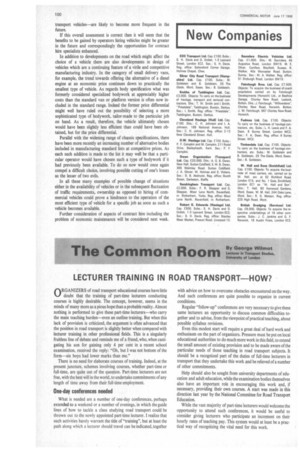The Common Room talu
Page 102

If you've noticed an error in this article please click here to report it so we can fix it.
LECTURER TRAINING IN ROAD TRANSPORT HOW?
ORGANIZERS of road transport educational courses have little doubt that the training of part-time lecturers conducting courses is highly desirable. The concept, however, seems in the minds of many more as a pious hope than a probable reality. Almost nothing is performed to give these part-time lecturers—who carry the main teaching burden—even an outline training. But when this lack of provision is criticized, the argument is often advanced that the position in road transport is slightly better when compared with lecturer training in other professional fields. This is a singularly fruitless line of debate and reminds me of a friend, who, when castigating his son for gaining only 4 per cent in a recent school examination, received the reply: "Oh, but I was not bottom of the form—six boys had lower marks than me."
There is no need for elaborate courses of training. Indeed, at the present juncture, schemes involving courses, whether part-time or full-time, are quite out of the question. Part-time lecturers are not free, with the best will in the world, to undertake commitments of any length of time away from their full-time employment.
One-day conferences needed What is needed are a number of one-day conferences, perhaps extended to a weekend or a number of evenings, in which the guide lines of how to tackle a class studying road transport could be thrown out to the newly appointed part-time lecturer. I realize that such activities barely warrant the title of "training", but at least the path along which a lecturer should travel can be indicated, together with advice on how to overcome obstacles encountered on the way. And such conferences are quite possible to organize in current conditions.
Regular "follow-up" conferences are very necessary to give these same lecturers an opportunity to discuss common difficulties together and to advise, from the viewpoint of practical teaching, about possible syllabus revisions.
Even this modest start will require a great deal of hard work and enthusiasm on the part of organizers. Pressure must be put on local educational authorities to do much more work in this field, to extend the small amount of existing provision and to be made aware of the particular needs of those teaching in road transport subjects. It should be a recognized part of the duties of full-time lecturers in transport that they undertake this work and be relieved of a number of other commitments.
Help should also be sought from university departments of education and adult education, while the examination bodies themselves also have an important role in encouraging this work and, if necessary, providing their own courses. A start was made in this direction last year by the National Committee for Road Transport Education.
While the vast majority of part-time lecturers would welcome the opportunity to attend such conferences, it would be useful to consider giving lecturers who participate an increment on their hourly rates of teaching pay. This system would at least be a practical way of recognizing the vital need for this work.




















































































































































